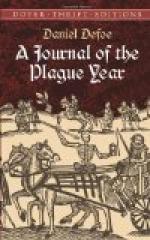Many of these were the miserable objects of despair which I have mentioned before, and were removed by the destruction which followed. These might be said to perish not by the infection itself but by the consequence of it; indeed, namely, by hunger and distress and the want of all things: being without lodging, without money, without friends, without means to get their bread, or without anyone to give it them; for many of them were without what we call legal settlements, and so could not claim of the parishes, and all the support they had was by application to the magistrates for relief, which relief was (to give the magistrates their due) carefully and cheerfully administered as they found it necessary, and those that stayed behind never felt the want and distress of that kind which they felt who went away in the manner above noted.
Let any one who is acquainted with what multitudes of people get their daily bread in this city by their labour, whether artificers or mere workmen—I say, let any man consider what must be the miserable condition of this town if, on a sudden, they should be all turned out of employment, that labour should cease, and wages for work be no more.
This was the case with us at that time; and had not the sums of money contributed in charity by well-disposed people of every kind, as well abroad as at home, been prodigiously great, it had not been in the power of the Lord Mayor and sheriffs to have kept the public peace. Nor were they without apprehensions, as it was, that desperation should push the people upon tumults, and cause them to rifle the houses of rich men and plunder the markets of provisions; in which case the country people, who brought provisions very freely and boldly to town, would have been terrified from coming any more, and the town would have sunk under an unavoidable famine.
But the prudence of my Lord Mayor and the Court of Aldermen within the city, and of the justices of peace in the out-parts, was such, and they were supported with money from all parts so well, that the poor people were kept quiet, and their wants everywhere relieved, as far as was possible to be done.
Two things besides this contributed to prevent the mob doing any mischief. One was, that really the rich themselves had not laid up stores of provisions in their houses as indeed they ought to have done, and which if they had been wise enough to have done, and locked themselves entirely up, as some few did, they had perhaps escaped the disease better. But as it appeared they had not, so the mob had no notion of finding stores of provisions there if they had broken in as it is plain they were sometimes very near doing, and which: if they bad, they had finished the ruin of the whole city, for there were no regular troops to have withstood them, nor could the trained bands have been brought together to defend the city, no men being to be found to bear arms.




